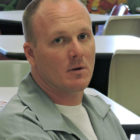
PHOENIX -- Science and legal experts from across the nation gathered at a Phoenix courtroom on Thursday to present research on neuroscience that could help decide future juvenile-committed crimes on Thursday. Arizona State University’s school of law hosted the “Adolescent Brains and Juvenile Justice” national conference, a biennial event, which brought an array of people together from policy-makers to judges. The aim of the event, held at the Sandra Day O’Connor U.S. Courthouse, was to explore research into adolescents’ brain development and the constitutionality of trying minors as adults. “This is an opportunity to explore the facts,” said Andrew Askland, a director at the law school. Currently, states such as Georgia can try minors as adults in serious crimes.


